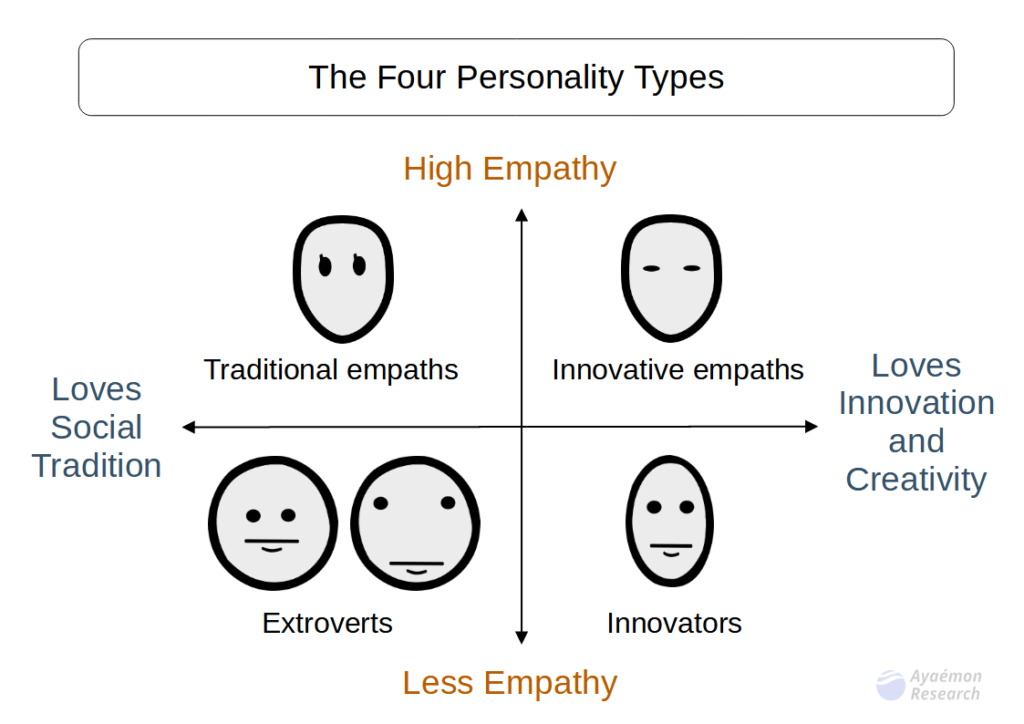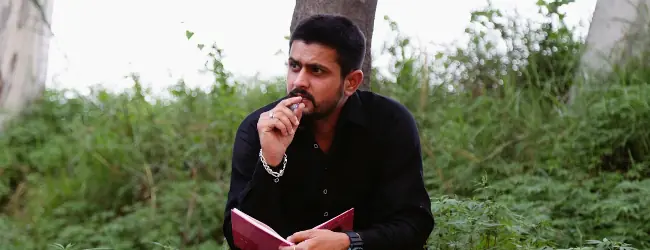I recently talked about the differences in our personalities. I introduced two of them in the previous article (this article). Today, I will explain the other two personalities: extroverts and innovative, empathic people.
How to find our personalities
Sometimes, we want to know our personalities. Perhaps we want them when we are confused about values. We suffer from everyday life and want to create a better life or future that suits us, but we don’t know what makes us energetic. That makes us want to know about personalities or individuality, which tells us how to live.
The four types of personalities I am proposing might work in such a case. I already explained two personalities in the previous article.

Today, I will introduce the other two personalities. This knowledge might tell us about a better lifestyle.
The four types of personalities
I will introduce them again, although I have frequently mentioned them. There are four types of personalities, as shown in the following image:

Let me explain each of them as follows:
- Extroverts: The most basic personality in society. They maintain social fundamentals. They compete to gain better social positions as winners. They value winners and leave behind losers or weak people. They are the majority.
- Traditional empaths: (Not in use this time)
- Innovative empaths: The most minority of personality in society. They have two additional brain features compared to extroverts: empathy and creativity. They can consider the state of weak people. In addition, they can create new things based on their logical thinking. However, those two features often make them mentally exhausted.
- Innovators: (Not in use this time)

The difference between extroverts and innovative empaths
The difference between extroverts and innovative empaths is whether they have two brain features: empathy and creativity. They are additional features. Although they require more mental resources, they can do more.
It is like a high-end model of products. For example, microwaves can do more compared to a simple stovetop. They allow us to do multiple things.
However, they have several disadvantages. First, they consume a lot of our mental energy. Next, we have to learn how to use their features efficiently. Finally, if we misuse them, we often become mentally ill.

In other words, extroverts are mentally simple but bearable with stress. A typical example is sociability. Socializing, including meeting new people, often stresses us out. However, extroverts are stress-resistant. That allows them to enjoy it. Many other stresses, such as roller coasters, conflicts, cigarettes, or horror movies, would entertain them. They are insensitive to stimuli.
The personality of innovative empaths
On the other hand, for innovative empaths, those two features consume their mental resources. Empathy allows us to consider other people’s emotions and imagine the future. Creativity makes us able to think logically and analyze events.
When those two features are performed together, we have an enormous amount of thought. We consider all future possibilities and risks while considering others, even if it is a small event.

We think, “I want to do this, but there are risks like this. In addition, I might have those risks in the future. I must prepare them. I have to consider my surroundings. I don’t want to bother them. Oh, what should I do?”
Such deep thinking exhausts us. In other words, it is overthinking or being too sensitive compared to extroverts. The two brain features—empathy and creativity—make us think deeply, even about the smallest events. Although it is a great talent in a risky environment, it is a big disadvantage in a stable environment.
Extroverts’ envy
However, extroverts envy those two features because extroverts can never have them, no matter how hard they try. Empathic people are valuable because they can care for others. Creative people are advantageous in building wealth because they can think logically and create new things. Even one is rare and precious, but innovative empaths have both!
In addition, extroverts never pretend to be innovative empaths because it is too difficult. Extroverts might pretend to be traditional empaths or innovators, although that will be revealed soon. However, extroverts never pretend to be both due to their difficulties.

From another perspective, it gives extroverts an inferiority complex towards innovative empaths. Innovative empaths are people who can do anything. Extroverts’s superiority is only that they have more physical or mental durability and strength.
The metaphor of elves
There is a good metaphor that implies innovative empaths. It is an elf. In fantasy games or stories, such as “The Lord of the Rings,” a different human species called elves sometimes appears. Perhaps you know it.
They often have pointed ears, live in the forest, respect nature, consider others, favor frugality, avoid conflicts or wars as well as possible, are skilled and wise, eat healthily, tend to be selfless, live long, live by self-help, are independent of the great powers, have own religion, and can talk with spirits.

Excluding pointed ears and living thousands of years, all those characteristics are based on empathy and creativity.
That would be an iconic impression of extroverts toward innovative empaths. It feels like a different species.
A direction of life for innovative empaths
If we are innovative empaths, perhaps we often wonder how to live. Our strange individuality makes us do so. We cannot live in the same way as our surroundings.
The metaphor of elves might tell us a way to live in such a case.
Try imagining the elves’ lives. Assume we are such a species. They maintain a distance from busy society and live quietly close to nature. They live as naturally as possible. If human society gets into crisis, they help. Such a lifestyle may also suit us.

Perhaps innovative empaths have two aspects in life. They are messiahs during the confusion era. They are hermits during the stable era.
That might be a lifestyle of innovative empaths.
Conclusion
The above is about the other two personalities: extroverts and innovative empaths.
This knowledge might tell us a way to have a better lifestyle.
Thank you for reading this article. I hope to see you in the next one.


